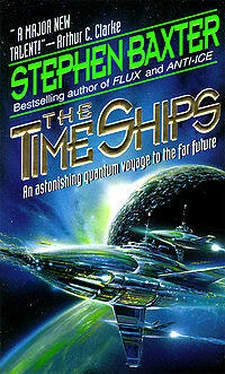There at the fringe of that ocean, with the gurgling water lapping about my toes and fingers, and with the sun warm on my neck, a great feeling of peace descended on me. As a child I had been taken for day-trips by my parents to Lympne and Dungeness, and I would walk to the edge of the Sea — just as I had today — and imagine I was alone in the world. But now, it was nearly true! It was remarkable to think that no ships sailed this new ocean, anywhere in the world; that there were no cities of men on the other side of the jungle behind me — indeed, the only flickers of intelligence on the planet were myself, and the poor, wounded Morlock. But it was not a forbidding prospect — not a bit of it — not after the awful darkness and chaos of 1938, which I had so recently escaped.
I straightened up. The Sea was charming, but we could not drink salt water! I took careful note of the point at which I had emerged from the jungle — I had no wish to lose Nebogipfel in that arboreal gloom — and I struck barefoot out along the water’s edge, away from the family of Diatryma.
After perhaps a mile, I came to a brook which bubbled out of the forest, and came trickling down the beach to the Sea. When I tested this, I found it to be fresh water, and it seemed quite clear. I felt a great access of relief: at least we should not die today! I dropped to my knees and plunged my head and neck in the cool, bubbling stuff. I drank down great gulps, and then took off my jacket and shirt and bathed my head and neck. Crusted blood, stained brown by exposure to the air, swirled away towards the Sea; and when I straightened up I felt much refreshed.
Now I faced the challenge of how to transport this bounty to Nebogipfel. I needed a cup, or some other container.
I spent some minutes sitting by the side of that stream, peering about in a baffled fashion. All my ingenuity seemed to have been exhausted by my latest tumble through time, and this final puzzle was one step too far for my tired brain.
In the end, I took my boots from my belt, rinsed them out as well as I could, and filled them up with stream water; then I transported them back along the beach and through the forest, to the waiting Morlock. As I bathed Nebogipfel’s battered face, and tried to rouse him to drink, I promised myself that the next day I should find something rather more suitable than an old boot to use as a dinner service.
Nebogipfel’s right leg had been mangled by the assault of the Diatryma; the knee seemed crushed, and the foot was resting at an unnatural angle. Using a sharp fragment of Time-Car hull — I had no knife — I made a rudimentary effort to shave his flaxen hair from the damaged areas. I washed off the exposed flesh as best I could: at least the surface wounds seemed to have closed, and there was no sign of infection.
During my clumsy manipulations — I am no medical man — the Morlock, still unconscious, grunted and mewled with pain, like a cat.
Having cleaned the wounds, I ran my hands along the leg, but could detect no obvious break in the shin or calf bones. As I had noted before, the main damage seemed to be in the knee and ankle areas, and I registered this with dismay, for, while I might have been able to set a broken tibia by touch, I could see no way I could treat such damage as Nebogipfel had sustained. Still, I rummaged through the wreckage of our car until I had found two straight sections of framework. I took my improvised knife to my jacket — I did not anticipate the garment being terribly useful in such a climate as this — and produced a set of bandages, which I washed off.
Then, taking my courage in my hands, I straightened out the Morlock’s leg and foot. I bound his leg tight to the splints, strapping it for support against the other, uninjured leg.
The Morlock’s screams, echoing from the trees, were terrible to hear.
Exhausted, I dined that night on oysters — raw, for I had no strength to construct a fire — and I propped myself up, close to the Morlock, with my back against a tree trunk and Moses’s wrench in my hand.
I established a camp on the shore of my Palaeocene Sea, close to that fresh-water brook I had found. I decided we should be healthier, and safer from attack, there rather than in the gloom of the forest. I set up a sunshade for Nebogipfel, using bits of the Time-Car with items of clothing stretched over them.
I carried Nebogipfel to this site in my arms. He was as light as a child, and still only half conscious; he looked up at me, helpless, through the ruins of his goggles, and it was hard for me to remember that he was a representative of a species which had crossed space, and tamed the sun!
My next priority was fire. The available wood — fallen branches and so forth — was moist and moldy, and I took to carrying it out to the edge of the beach, to allow it to dry. With some fallen leaves to act as kindling, and a spark from a stone beaten against Time-Car metal, I was able to ignite a flame readily enough. At first I went through the ritual of restarting the fire daily, but soon discovered the doubtless ancient trick of keeping coals glowing in the fire’s pit during the day, with which it was a simple matter to re-ignite the blaze as required.
Nebogipfel’s convalescence progressed slowly. Enforced unconsciousness, to a member of a species who do not know sleep, is a grave and disturbing thing, and on his revival he sat in the shade for some days, passive and unwilling to talk. But he proved able to eat the oysters and bivalves I fetched up from the Sea, albeit with a deep reluctance. In time I was able to vary our diet with the cooked flesh of turtle — for that creature was quite abundant, all along the shore. After some practice, I succeeded in bringing down clusters of the fruits of the shoreline palm trees by hurling lumps of metal and rocks high into the branches. The nuts proved very useful: their milk and flesh varied our diet; their empty shells served as containers for a variety of purposes; and even the brown fibers which clung to the shells were capable of being woven into a crude cloth. However, I have no great facility for such fine work, and I never got much further than making myself a cap — a broad-brimmed affair, like a coolie’s.
Still, despite the munificence of the Sea and the palms, our diet was monotonous. I looked with envy at the succulent little creatures which clambered, out of my reach, through the branches of the trees above me.
I explored the shore of the Sea. Many types of creature inhabited that oceanic world. I observed wide, diamond-shaped shadows skimming the surface, which I believe were rays; and twice I saw upright fins — beating with purpose through the water, at least a foot high — which could only be the signs of huge sharks.
I spotted an undulating form, cruising through the surface of the water perhaps a half mile from land. I made out a wide, hinged jaw, inset with small, cruel teeth, and white flesh behind. This beast was perhaps five feet long, swimming by means of undulations of its sinuous body. I reported this sighting to Nebogipfel, who — retrieving a little more of that encyclopedic body of data stored in his little skull — identified it as Champsosaurus: an ancient creature, related to the crocodile, and in fact a survivor of the Age of the Dinosaurs — an Age already long vanished by this Palaeocene period.
Nebogipfel told me that in this period, the ocean-going mammals of my century whales, sea-cows and so forth — were in the midst of their evolutionary adaptation to the Sea, and lived still as large, slow-moving land animals. I kept a wary eye out for a basking land-whale, for surely I should be able to hunt down such a slow-moving animal — but I never saw one.
Читать дальше
Конец ознакомительного отрывка
Купить книгу









